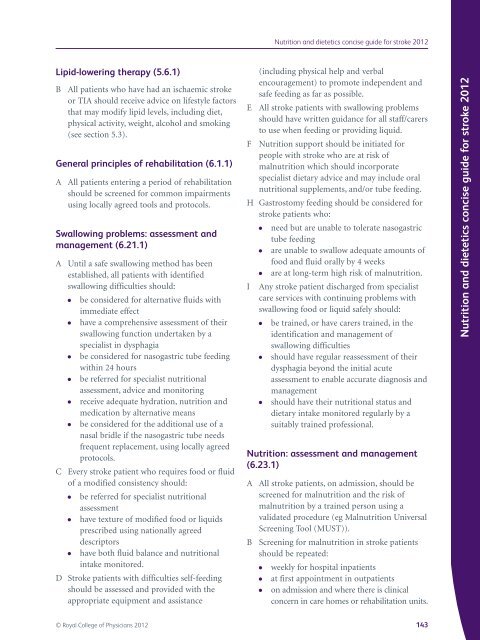national-clinical-guidelines-for-stroke-fourth-edition
national-clinical-guidelines-for-stroke-fourth-edition
national-clinical-guidelines-for-stroke-fourth-edition
Create successful ePaper yourself
Turn your PDF publications into a flip-book with our unique Google optimized e-Paper software.
Lipid-lowering therapy (5.6.1)<br />
B All patients who have had an ischaemic <strong>stroke</strong><br />
or TIA should receive advice on lifestyle factors<br />
that may modify lipid levels, including diet,<br />
physical activity, weight, alcohol and smoking<br />
(see section 5.3).<br />
General principles of rehabilitation (6.1.1)<br />
A All patients entering a period of rehabilitation<br />
should be screened <strong>for</strong> common impairments<br />
using locally agreed tools and protocols.<br />
Swallowing problems: assessment and<br />
management (6.21.1)<br />
A Until a safe swallowing method has been<br />
established, all patients with identified<br />
swallowing difficulties should:<br />
● be considered <strong>for</strong> alternative fluids with<br />
immediate effect<br />
● have a comprehensive assessment of their<br />
swallowing function undertaken by a<br />
specialist in dysphagia<br />
● be considered <strong>for</strong> nasogastric tube feeding<br />
within 24 hours<br />
● be referred <strong>for</strong> specialist nutritional<br />
assessment, advice and monitoring<br />
● receive adequate hydration, nutrition and<br />
medication by alternative means<br />
● be considered <strong>for</strong> the additional use of a<br />
nasal bridle if the nasogastric tube needs<br />
frequent replacement, using locally agreed<br />
protocols.<br />
C Every <strong>stroke</strong> patient who requires food or fluid<br />
of a modified consistency should:<br />
● be referred <strong>for</strong> specialist nutritional<br />
assessment<br />
● have texture of modified food or liquids<br />
prescribed using <strong>national</strong>ly agreed<br />
descriptors<br />
● have both fluid balance and nutritional<br />
intake monitored.<br />
D Stroke patients with difficulties self-feeding<br />
should be assessed and provided with the<br />
appropriate equipment and assistance<br />
Nutrition and dietetics concise guide <strong>for</strong> <strong>stroke</strong> 2012<br />
(including physical help and verbal<br />
encouragement) to promote independent and<br />
safe feeding as far as possible.<br />
E All <strong>stroke</strong> patients with swallowing problems<br />
should have written guidance <strong>for</strong> all staff/carers<br />
to use when feeding or providing liquid.<br />
F Nutrition support should be initiated <strong>for</strong><br />
people with <strong>stroke</strong> who are at risk of<br />
malnutrition which should incorporate<br />
specialist dietary advice and may include oral<br />
nutritional supplements, and/or tube feeding.<br />
H Gastrostomy feeding should be considered <strong>for</strong><br />
<strong>stroke</strong> patients who:<br />
● need but are unable to tolerate nasogastric<br />
tube feeding<br />
● are unable to swallow adequate amounts of<br />
food and fluid orally by 4 weeks<br />
● are at long-term high risk of malnutrition.<br />
I Any <strong>stroke</strong> patient discharged from specialist<br />
care services with continuing problems with<br />
swallowing food or liquid safely should:<br />
● be trained, or have carers trained, in the<br />
identification and management of<br />
swallowing difficulties<br />
● should have regular reassessment of their<br />
dysphagia beyond the initial acute<br />
assessment to enable accurate diagnosis and<br />
management<br />
● should have their nutritional status and<br />
dietary intake monitored regularly by a<br />
suitably trained professional.<br />
Nutrition: assessment and management<br />
(6.23.1)<br />
A All <strong>stroke</strong> patients, on admission, should be<br />
screened <strong>for</strong> malnutrition and the risk of<br />
malnutrition by a trained person using a<br />
validated procedure (eg Malnutrition Universal<br />
Screening Tool (MUST)).<br />
B Screening <strong>for</strong> malnutrition in <strong>stroke</strong> patients<br />
should be repeated:<br />
● weekly <strong>for</strong> hospital inpatients<br />
● at first appointment in outpatients<br />
● on admission and where there is <strong>clinical</strong><br />
concern in care homes or rehabilitation units.<br />
© Royal College of Physicians 2012 143<br />
Nutrition and dietetics concise guide <strong>for</strong> <strong>stroke</strong> 2012


